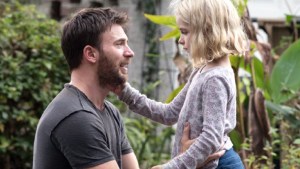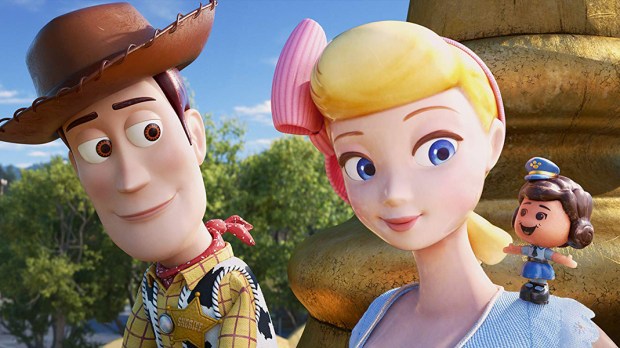Toy Story changed the game.
Before Pixar’s original Toy Story came out in 1995, cartoons were for kids. Oh, at their best, they could be beautiful and powerful and even teach some good lessons. You’re beautiful just the way you are! they said. You can do anything!
But Toy Story took these themes and gave them a quarter twist, giving them more heft and complexity: What if I don’t feel beautiful? The original film asked. What happens when you meet someone who makes you feel ugly and jealous, like when Woody first met Buzz? What if you can’t do everything, like when Buzz realized he couldn’t really fly? These themes made adults sit up a little straighter and listen a little closer. Sure, kids still loved Woody and Buzz. They still learned some great lessons about friendship and sacrifice. But make no mistake: This movie was made for Moms and Dads, too.
Since then, Pixar (now officially a wing in Disney’s corporate castle) has released a score of films, most of them critical and commercial hits, and the studio’s storytelling has grown more sophisticated with time. Toy Story 4 might not be the best Toy Story movie to some, but it’s without question the most narratively ambitious—and it doles out several lessons that more cautious movies would never even dare.
Interestingly, most revolve around the concept of purpose. Let’s take a look at four of them …
The difficulty of change
Change is hard for everyone, and when Bonnie—the little girl who owns Woody, Buzz and the gang now—has to go to kindergarten, the poor thing acts like she’s being sent to the battlefront. She’s terrified of going to a new school with new people. So despite orders from the school to not bring any toys to class, Woody sneaks into Bonnie’s backpack. She could use a friend, Woody figures. And he’s right.
But Woody has another motive. See, his life is changing, too, and this do-good act is, in a way, kind of selfish—a way to ingratiate himself back into Bonnie’s favored toy rotation.
By this point, Woody’s just an afterthought in Bonnie’s world—stuck in the closet more often than not. And when he talks about his lot, we hear echoes of our own struggles with change. Sometimes he sounds like an empty-nest father whose children don’t seem to need him anymore. Sometimes he sounds like an old corporate workhorse left behind in a new environment. As viewers, we can see that the purpose that Woody embraced for so long—his calling, if you will—has changed. I think all of us struggle at times with changes at work or home, But we especially struggle when it feels like our calling—the thing that we feel God made us for, the purpose we strove to fulfill—seems irrelevant. When it feels like we’re irrelevant.
Woody’s pathway to redemption isn’t an easy one, and to go down this path will get into spoilers I don’t want to get into. But he teaches us that even our purpose no longer is what it had been (or what we imagined it to be), we can still find meaning in our lives. We just might have to look in some unexpected places to find it.
The mystery of creation
At school, Woody stays hidden. But when Bonnie looks like she’s at her lowest point, Woody sneaks out of the backpack, dives into a wastebasket and retrieves … well, a bunch of trash: A pipe cleaner. Some crayons. An old plastic spork. Bonnie perks up when she sees all these raw materials and starts to work—eventually creating a new playmate: Forky. But Forky doesn’t like his new status one little bit.
I went into this in greater detail elsewhere, but Forky is essentially freaked out by his newfound sentience. He wants to be, literally, garbage. From trashes to trashes, you might say. He, too, is struggling with his sense of purpose. And finally, Woody helps give him one. It’s to love Bonnie—love his creator, you might say—and to be loved in return.
Simply put, that’s our purpose, too: To love and be loved by the God who made us. And yet, that answer barely touches the beauty and mystery of creation. So many other questions remain, hinting at the beauty and mystery of the why of our lives. To love and be loved feels like a bullet point in a business plan, where our lives are sprawling novels or epic poems. And tellingly, the makers acknowledge the mystery of creation in the movie’s very last lines.
The beauty of imperfection
After making countless dashes to the trashcan, Forky finally comes to accept his new life as a beloved toy. He understands his purpose. Gabby Gabby—the antique pull-string doll who serves as the movie’s prime antagonist—understands what hers should be, too. Unlike Forky, she knows she’s a toy. She knows that she should be bringing a child love and joy. She wants that more than anything. But Gabby Gabby feels desperately incapable of that: See, her voice box is broken: It was so from the moment of her creation. And because of that flaw in herself, Gabby Gabby feels she’s incapable of being loved. And she’ll do anything—anything—to make herself “right” again.
She offers a stark contrast to that of Forky—who, after all, is technically just a bunch of garbage stuck together. Through these two new characters, we’re reminded of something really important: We’re not lovable because we’re perfect. We’re lovable because we’re … us.
The importance of serving others
The life of a toy is, ultimately, a life of servanthood. Every single Toy Story movie returns to that basic theme again and again. Woody and Buzz live and labor for their kids. But as we all know, kids eventually move on. They outgrow their love and need of their favorite things. What then?
In flashback, we see Bo Peep, a porcelain lamp that for years comforted Andy and his little sister, Molly, boxed up and given away. Much later, we meet a very different Bo Peep on the streets—a rough-and-tumble adventurer who shows that life extends beyond a child’s bedroom door. She doesn’t even really long to be loved by a child anymore. Not that she’s admitting, anyway. But even so, she, Woody and a handful of new friends work to pair love-starved toys with children—indirectly fulfilling their central calling.
Again, Toy Story emphasizes that purpose—our real, God-given purpose—is found in serving others. We all have opportunities to serve in our lives: At home, at work, through volunteer opportunities, even walking down the street. Sometimes our ability to serve changes. Sometimes it veers from what we wanted or dreamed it would be. But the opportunity is always there. And when we humble ourselves to serve, we find ourselves fulfilling the purpose that God designed us for.
The themes and lessons don’t necessarily stop there. Yes, Toy Story 4 is a funny, delightfully entertaining story for both kids and their parents. But scratch a little deeper, and you just might find some elements that’ll stick with you long after the credits roll.

Read more:
14 Movies that will make a grown man cry

Read more:
5 Christian movies to see this summer

